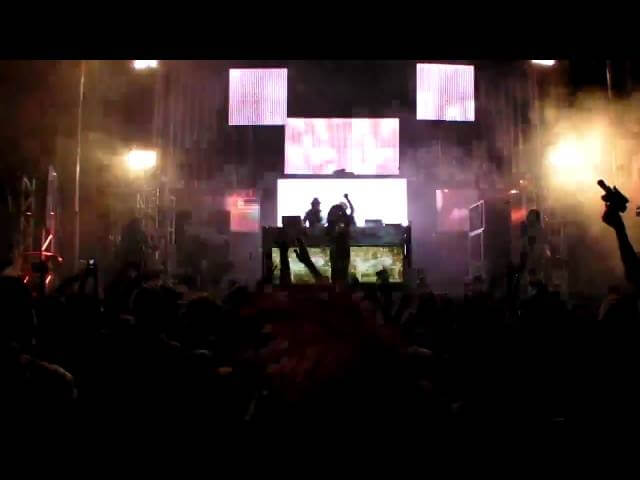Major Lazer wants to party with you

By their own admission, producers/DJs Diplo (Wes Pentz) and Switch (Dave Taylor) founded Major Lazer as an excuse to revel in Jamaican culture. The two recorded 2009’s Guns Don’t Kill People… Lazers Do at Bob Marley’s Tuff Gong Studios in Kingston, augmenting their club-quaking dancehall thumps with a procession of guests both Jamaican (Vybz Kartel, T.O.K) and otherwise (Santigold, Amanda Blank); even the group’s goofy titular mascot—a burly, sunglasses-wearing commando who replaced an arm he lost in a zombie war with a laser gun—calls the country home. And much is currently afoot in Camp Lazer: The duo just completed Digital Reggae with guest spots by M.I.A. and Thom Yorke, and their animated namesake will be receiving an Adult Swim show soon. Before Major Lazer’s show this Tuesday at Cervantes’ Masterpiece Ballroom, Switch spoke to The A.V. Club about their bonkers live experience and his work-in-progress plan for the greatest tour ever.
The A.V. Club: You’ve said before that Major Lazer showcases Jamaican music because of how it influences Western music without receiving due credit.
Dave Taylor: Jamaican music comes from them trying to replicate America. For the last five or six years, it’s been hip-hop. It’s surprising how Third World Jamaica still is: anything they see, they take. It’s not a copycat thing. It’s almost like they take it and interpolate it in their own style, which as a producer and a DJ, is something me and Wes really connect with. You can hear [producer] Stephen McGregor listening to Timbaland and turning it into his own thing, which totally blows up the club in Jamaica.
AVC: What should Western music learn from Jamaican music?
DT: The best thing about Jamaican music is that you can’t take the piss out of it. It’s so solid and so stand-up. A lot of Westernized pop music is very formulaic and processed—it’s transparent, it’s cheap, it’s nasty. You can’t get away with that in Jamaica.
AVC: What would have changed had Guns Don’t Kill People been recorded in L.A. or New York instead of Kingston?
DT: We get so inspired by [Kingston] just being there for a couple of weeks. You’re surrounded by sound and movement. Musically, Jamaica reinvents itself so quickly. Every few months, there’s a new direction. There’s always something crazier than the last time we were there. Being there gives you a different train of thought.
AVC: Major Lazer’s live show is a spectacle with a hype-man Skerrit Bwoy, costumes, animated backdrops, dancers dry humping, and stuff thrown out to the audience. Why make this experience so over the top?
DT: Me and Wes have DJed pretty far-flung places around the world and as soon as we go to the club [in Jamaica], it’s like nothing else. Everybody is so up on what music is about. A Jamaican show lets our fans know that we give a shit. We’re going to have fun tonight and we want you to come with us.
 Keep scrolling for more great stories.
Keep scrolling for more great stories.
